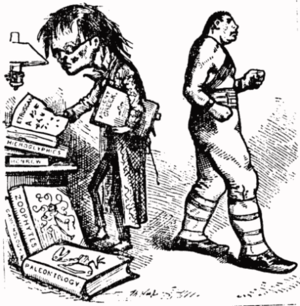
Back معاداة الفكر Arabic Антыінтэлектуалізм Byelorussian Антиинтелектуализъм Bulgarian বুদ্ধিজীবিতা-বিরুদ্ধবাদ Bengali/Bangla Antiintel·lectualisme Catalan دژە ڕووناکبیری CKB Gwrthddeallaeth Welsh Antiintellektualismus German Antiintelectualismo Spanish Antiintelektualismo Basque

| Part of a series on |
| Discrimination |
|---|
 |
Anti-intellectualism is hostility to and mistrust of intellect, intellectuals, and intellectualism, commonly expressed as deprecation of education and philosophy and the dismissal of art, literature, history, and science as impractical, politically motivated, and even contemptible human pursuits.[1] Anti-intellectuals may present themselves and be perceived as champions of common folk—populists against political and academic elitism—and tend to see educated people as a status class that dominates political discourse and higher education while being detached from the concerns of ordinary people.[1]
Totalitarian governments have, in the past, manipulated and applied anti-intellectualism to repress political dissent.[2][better source needed] During the Spanish Civil War (1936–1939) and the following dictatorship (1939–1975) of General Francisco Franco, the reactionary repression of the White Terror (1936–1945) was notably anti-intellectual, with most of the 200,000 civilians killed being the Spanish intelligentsia, the politically active teachers and academics, artists and writers of the deposed Second Spanish Republic (1931–1939).[3] During the Cambodian genocide (1975–1979), the totalitarian regime of Cambodia led by Pol Pot nearly destroyed its entire educated population.